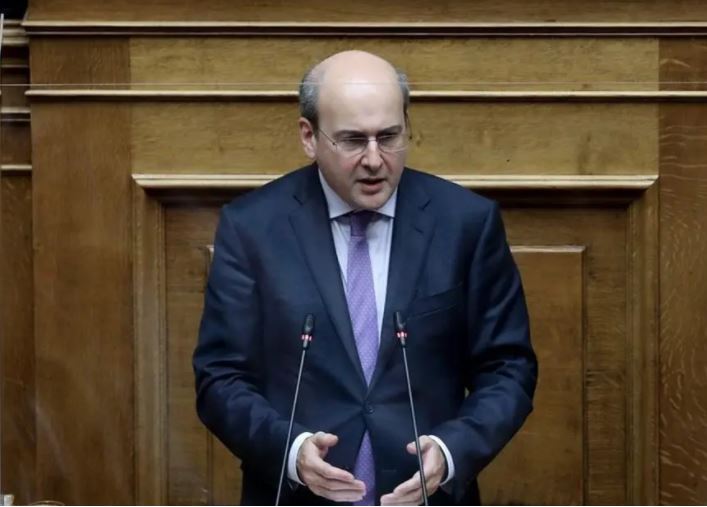
As of Sunday, May 1, the minimum wage increased by 7.5 pct, on top of the 2 pct increase introduced in January 2022, rising to 713 euros per month from 663 euros previously. The corresponding minimum daily wage will increase to 31.85 euros from 29.62 euros.
Talking to the Athens-Macedonian News Agency (ANA), Labour and Social Affairs Minister, Kostis Hatzidakis, said the new minimum wage will apply from Sunday and noted that the extra 50 euros per month amount to almost one month’s wages on an annual basis for workers in the private sector, who receive the equivalent of 14 monthly wages a year.
Combined with the previous 2 pct wage increase in January and the reduction in social insurance contributions paid by employees, this amounts to an 11.8 pct increase in annual take-home pay, Hatzidakis noted.
“This is an increase that occupies the extreme limits of what the economy can support – and this in an environment of strong uncertainty – and one which to a significant degree absorbs the losses in employees’ purchasing power due to the inflationary pressures born of the international energy crisis and gives them a “dividend” from the high growth rates achieved in 2021,” the minister said.
At the same time, he clarified, the increase in the minimum wage did not undermine the competitiveness of businesses, considering that the latter were supported by the government in a number of ways, such as a reduction in taxes and lower social insurance payments, aid handed out during the pandemic and subsidies for energy.
“We took these parameters into account in our decision to increase the minimum wage, which put those that are weakest at the centre and is obviously not the only tool for supporting workers,” Hatzidakis added, pointing out that the government had taken a series of measures to offset the increase in the cost of living for the more vulnerable groups, such as lowering income and property taxes, handing out subsidies for energy bills and fuel, as well as one-off payments to low-income pensioners, people with disabilities and others.
According to a recent ministry announcement, the increase in the minimum wage concerns roughly 650,000 employees and the combined benefit of the wage increases and lower deductions amounts to 906 euros on an annual basis.
The increase in the minimum wage will also increase the amount received in unemployment benefit, which will rise to 438 euros per month from 407.25 euros previously, or 17.51 euros per day from 16.29 euros. Also increased are various other benefits calculated on the basis of the minimum wage, such as parental leave, pay for work experience programmes, maternity leave, strike pay and others.
Latest News

Airbnb: Greece’s Short-Term Rentals Dip in March Amid Easter Shift
Data from analytics firm AirDNA shows that average occupancy for short-term rentals dropped to 45% in March, down from 49% the same month last year.

Easter Week in Greece: Holy Friday in Orthodoxy Today
At the Vespers service on Friday evening the image of Christ is removed from the Cross and wrapped in a white cloth

Meloni and Trump Meet in Washington, Vow to Strengthen Western Ties
“I am 100% sure there will be no problems reaching a deal on tariffs with the EU—none whatsoever,” Trump stressed.

ECB Cuts Interest Rates by 25 Basis Points in Expected Move
The ECB’s Governing Council opted to lower the deposit facility rate—the benchmark for signaling monetary policy direction—citing an updated assessment of inflation prospects, the dynamics of underlying inflation, and the strength of monetary policy transmission.

Current Account Deficit Fell by €573.2ml Feb. 2025: BoG
The improvement of Greece’s current account was mainly attributed to a more robust balance of goods and, to a lesser extent, an improved primary income account

Hellenic Food Authority Issues Food Safety Tips for Easter
Food safety tips on how to make sure your lamb has been properly inspected and your eggs stay fresh.

Greek Kiwifruit Exports Smash 200,000-Ton Mark, Setting New Record
According to data by the Association of Greek Fruit, Vegetable and Juice Exporters, Incofruit Hellas, between September 1, 2024, and April 17, 2025, kiwifruit exports increased by 14.2%.

Easter Tourism Boom: Greece Sees 18.3% Surge in Hotel Bookings
Among foreign markets, Israel has emerged as the biggest growth driver, with hotel bookings more than doubling—up 178.5% year-on-year.

Greece to Launch Fast-Track Tender for Offshore Hydrocarbon Exploration
Last week, Papastavrou signed the acceptance of interest for the two Cretan blocks, while similar decisions regarding the two Ionian Sea blocks were signed by his predecessor

American-Hellenic Chamber of Commerce to Open Washington D.C. Branch
AmCham's new office aims aims to deepen U.S.-Greece economic ties and promote investment and innovation between the two countries








![Πλημμύρες: Σημειώθηκαν σε επίπεδα ρεκόρ στην Ευρώπη το 2024 [γράφημα]](https://www.ot.gr/wp-content/uploads/2025/04/FLOOD_HUNGRY-90x90.jpg)




![Airbnb: Πτωτικά κινήθηκε η ζήτηση τον Μάρτιο – Τι δείχνουν τα στοιχεία [γράφημα]](https://www.ot.gr/wp-content/uploads/2024/07/airbnb-gba8e58468_1280-1-90x90.jpg)












![ΙΟΒΕ: Πώς το δημογραφικό υπονομεύει την ανάπτυξη – Τι συμβαίνει στις ελληνικές περιφέρειες [γραφήματα]](https://www.ot.gr/wp-content/uploads/2025/04/dimografiko-600x375.jpg)












![Airbnb: Πτωτικά κινήθηκε η ζήτηση τον Μάρτιο – Τι δείχνουν τα στοιχεία [γράφημα]](https://www.ot.gr/wp-content/uploads/2024/07/airbnb-gba8e58468_1280-1-600x500.jpg)


 Αριθμός Πιστοποίησης
Αριθμός Πιστοποίησης